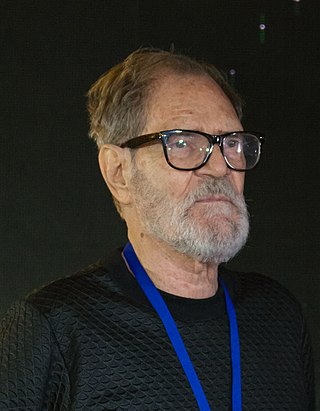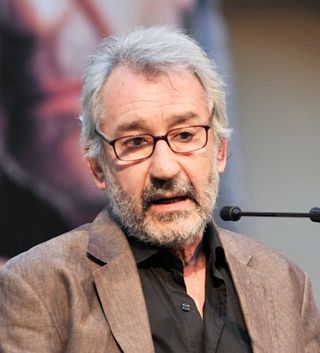Related Research Articles

Paloma Cecilia San Basilio Martínez, known as Paloma San Basilio, is a Spanish singer, songwriter, producer and actress. She was awarded with a Latin Grammy Lifetime Achievement Award for contributions to Latin music. She has sold millions of records throughout her career, with styles that range from melodic songs to pop. She often appeared in various musicals such as the Spanish-language premiere production of Andrew Lloyd Webber's Evita in Madrid. Some other musical theater works include Man of La Mancha, My Fair Lady, Victor/Victoria, and Sunset Boulevard.

Alejandro Rodríguez Álvarez, known as Alejandro Casona was a Spanish poet and playwright born in Besullo, Spain, a member of the Generation of '27. Casona received his bachelor's degree in Gijon and later studied at the University of Murcia. After Franco's rise in 1936, he was forced, like many Spanish intellectuals, to leave Spain. He lived in Buenos Aires, Argentina until April 1962, when he definitively returned to Spain.

Alejandro Sieveking Campano was a Chilean playwright, theatre director and actor.

José María Sacristán Turiégano, better known as José Sacristán, is a Spanish film, theatre, and television actor.

Concepción Velasco VaronaOAXS MML, known professionally as Concha Velasco, or Conchita Velasco in her beginnings, is a Spanish actress, singer and television presenter. She has received numerous accolades throughout her career in film, theater and television spanning over six decades, including two National Theater Awards presented by the Spanish Ministry of Culture in 1972 and 2016, the Lifetime Achievement Award presented by the Spanish Television Academy in 2009 and the Honorary Goya Award presented by the Spanish Film Academy in 2012.

Francisco "Paco" Madrid was a Spanish (Catalan) journalist, writer and screenwriter.

María de la Encarnación Gertrudis Jacoba Aragoneses y de Urquijo was a Spanish author of children's literature who wrote under the pen name Elena Fortún. She became famous for Celia, lo que dice the first in the series of children's novels which were a collection of short stories first published in magazines in 1929. The series were both popular and successful during the time of their publications and are today considered classics of Spanish literature.
Antonia García Fernández-Gúzman de Videgain was a Spanish singer and actress.
Paloma Díaz-Mas is a Spanish writer and scholar.
Alfonso Paso was a Spanish dramatist. He wrote over a hundred plays, mainly light comedies, sometimes laced with black humour and tragedy. There were also police dramas and examples of what he called "social theatre". He was known for the well crafted complexity of his plots and for the originality of his situations and characters.

Anna Castillo Ferré is a Spanish actress. From 2013 to 2016, she played Dorita in soap opera Amar es para siempre. Her film breakthrough came with the role of Alma in the drama El Olivo (2016) for which she won a Goya Award for Best New Actress.

Juan Margallo is a Spanish actor, theater director and dramaturge. He has been considered one of the main actors in the Spanish theater. He has worked with Miguel Narros, Luis Escobar Kirkpatrick and José Tamayo. In 1976 he played Woyzeck, by Georg Büchner and La sangre y la ceniza, by Alfonso Sastre. He was awarded the prestigious national award 'Premio Nacional de Teatro 2022'.

María José Goyanes Muñoz is a Spanish actress.

Paloma Rocío Castillo Astorga, known professionally as Paloma Mami, is a Chilean-American singer-songwriter. She began her musical career in 2018, and her first studio album, Sueños de Dalí, was released in March 2021.
Adela Galiana y Albaladejo, also known as Adela Galiana de Osterman was a Spanish writer, playwright, poet and columnist.

Ángela Cremonte is a Spanish-Argentine actress. She is best known for her performance playing Elisa in Cable Girls.
Ana Acosta is an Argentine actress and comedian.
This is a list of Spanish television related events from 1962.
This is a list of Spanish television related events from 1966.

Nerea Rodríguez Rodríguez is a Spanish singer who rose to fame for her participation in the program Operación Triunfo 2017.
References
- ↑ Staff (2002). "pedrero". Swarthmore College. Retrieved 18 March 2011.
- 1 2 Staff (2011). "Paloma Pedrero en escritoras.com". escritoras.com. Retrieved 18 March 2011.
- ↑ Staff (2011). "Los géneros literarios. Teatro: Paloma Pedrero". ensayistas.org. Retrieved 18 March 2011.
- ↑ Staff (2011). "Paloma Pedrero - complete guide to the Playwright and Plays". doollee.com. Retrieved 18 March 2011.